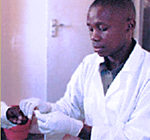FEATURE: Time for a New Era of Science Diplomacy (02/09/07)
http://www.sciencemag.org/cgi/content/summary/315/5813/769

|
As Russia Advances, High Tech Gets Left Behind
http://www.washingtonpost.com/wp-dyn/content/article/2007/07/10/AR2007071001764.html
Although Russia has a nearly 100 percent literacy rate and a large population
of highly educated scientists and engineers, technology and entrepreneurship
are not favored careers. Lack of government support and investment capital
as well as lack of cultural images of entrepreneurial success contribute to
this lack of tech growth.
Iraqi youths cursed with unemployment
http://www.cnn.com/2007/WORLD/meast/07/10/iraq.unemployment.ap/index.html?iref=newssearch
An estimated seventy percent of Iraqi people are unemployed, including many
scientists and engineers who invested in education in hopes of securing better
jobs. Most companies cannot afford to hire new employees as they rely on government
contracts.
Do Not Make a Distinction Between Teaching and Research'
http://www.sciencemag.org/cgi/content/
Antônio Carlos Pavão of the Federal University of Pernambuco
is a chemistry professor devoted to improving the quality of Brazilian science
education. Brazilian students ranked last in math and 40th in science in a
2003 study of 41 countries.
A New Dawn for Science in Africa
http://www.sciencemag.org/cgi/content/full/316/5833/

|
'I Wish … I Could Give [Them All] Computers'
http://www.sciencemag.org/cgi/content/full/317/
Leslie Lekala, a senior lecturer in physics and mathematics of the University
of South Africa, a distance learning institution, struggles with the difficulties
of teaching via phone in various languages, as many students lack access to
the internet.
Ugandan Charity Offers Students Scholarships to Study Science, Technology
(05/28/07)
http://www.newvision.co.ug/D/8/13/567554
The Muljibhai Madhvani Foundation, a Ugandan charity established in 1965,
announced recently that it will be offering scholarships for Ugandan students
in scientific and technical studies.
Education, Technology and the Future of India (06/12/07)
http://www.cxotoday.com/India/News/Education_Technology_and_the_Future_of_India/551-81612-912.html
Bill Gates praises “the India miracle,” rapid growth in India’s
contribution to high-tech fields. He attributes India’s success to investments
in education and cites reduced hunger, improved literacy, and better health
as results of these investments. He also reaffirms his commitment to spread
low-cost computing throughout India to help students to realize their potential.
Thailand Biotech Company Gets BOI Seal Of Approval For Adult Stem
Cells (05/29/07)
http://www.medicalnewstoday.com/medicalnews.php?newsid=72365
TheraVitae, an Israeli-Thai stem cell therapy company, recently received approval
from Thailand’s Board of Investment (BOI). This approval will enable
the company to build the world’s largest stem cell laboratory, to import
scientists, technicians, and equipment from other areas of the world, and
to be more attractive to investors. Last year TheraVitae received the World
Economic Forum “Pioneer Award,” which has also been awarded to
such firms as Google in the past.
Jaimini Bhagwati: `It is technology, stupid’ (05/28/07)
http://www.business-standard.com/common/storypage.php?autono=285917&leftnm=4&subLeft=0&chkFlg
Bhagwati argues that India’s successes in telecommunications and software
exports are not mirrored in other areas of technological advancement. He cites
the relative lack of patents filed in India, India’s low rank on the
World Bank Knowledge Economy Index, and Indian universities’ under representation
on worldwide university rankings. Bhagwati also criticizes India’s slow
pace at developing high-tech defense mechanisms and atomic energy and suggests
that education in India should be improved and that legislators should focus
on building human capital.
Delhi to get Science and Technology Park soon (05/25/07)
http://www.indiaedunews.net/Delhi/Delhi%5Fto%5Fget%5FScience%5Fand%5FTechnology%5FPark%5Fsoon%5F1161/
A new science and technology park focusing on information technology, nano-technology,
and biotechnology, among other things, is to be built in New Delhi. The purpose
of the park is to provide a link between institutional research and industry.
The planners hope that the project will be finished by September and that
it will establish New Delhi as a center of advanced scientific research.
UMC opens nano lab in Taiwan (05/24/07)
http://computerworld.com.my/ShowPage.aspx?pagetype=2&articleid=5068&pubid=4&issueid=114
United Microelectronics Corporation (UMC) recently unveiled a new nanotechnology
lab which will focus on improving production technology for chips measuring
45 nanometers and smaller. The lab cost 1 billion New Taiwanese dollars, or
30 million US dollars, and will provide a strong boost for southern Taiwan,
creating more than 1000 new jobs for research engineers. This center stands
beside UMC’s most advanced semiconductor plant in Taiwan and near to
a similar factory that UMC is currently building, which will cost US$5 billion
and produce 50,000 wafers per month.
South Korea's top Web portal looking to expand (05/23/07)
http://www.technologyreview.com/Wire/18777/
Chae Hwi-young, CEO of NHN Corporation, South Korea’s top web portal
(equivalent to Google in the US) recently announced that it will attempt to
acquire a company with greater search engine technology in order to become
a global internet resource by capitalizing on online advertising. The South
Korean search-related advertising market is expected to jump from 700 billion
won (750 million USD) to 1.6 trillion won (1.7 billion USD) by 2010. NHN currently
accounts for 77 percent of all internet searches in South Korea, and plans
to expand its search engine capabilities first to Japan, following up with
China and Vietnam.
'It's Important to Ask Students To Do Some Work on Their Own'
http://www.sciencemag.org/cgi/content/full/317/5834/
China’s math and science education, particularly in the area of physics,
has traditionally emphasized memorization and has not required knowledge of
English. New approaches are demanding more interactive and creative knowledge
of physics and are teaching English to prepare students for careers abroad.
How Microsoft conquered China (07/09/07)
http://money.cnn.com/magazines/fortune/fortune_archive/2007/07/23/100134488/index.htm
Microsoft has finally begun to have success in its China Market. Initially
plagued by counterfeiters and lack of intellectual property protection, Microsoft
dropped prices and partnered with the government, offering discounts in exchange
for requiring the genuine form of Microsoft software in government agencies
and PC manufacturers.
Spreading Knowledge of Science and Technology
http://www.sciencemag.org/cgi/content/full/317/5834/77
Keio University in Japan is one of the few Japanese institutions to offer science classes to non science majors, but other universities are planning to follow suit. Although science classes have been enjoyable and useful for many students, challenges include differences in science preparation and lab expenses.
Beyond Islands of Excellence
http://www.sciencemag.org/cgi/content/full/317/5834/74
Nandula Raghuram, a professor of molecular biology at Guru Gobind Singh Indraprastha University in India, strives to teach students as much as possible on a limited budget, often using makeshift equipment. He also provides career counseling to students who do not receive such services from the university.
Back to India (07/23/07)
http://members.forbes.com/forbes/2007/0723/086.html
Harsh Manglik, head of Accenture, as well as many other Indian executives
and professionals are returning to India after attaining education and job
success in America. Many take similar jobs, but others focus on investing
in India’s growing technology sector.
Indian Tech Revenue to Hit New Heights (07/06/07)
http://www.businessweek.com/globalbiz/content/jul2007/gb2007076_102422.htm?chan=search
The Indian software and services sector is predicted to grow by 27 percent
in the next year, up to $50 billion, 5.2% of India’s annual GDP.
Changes Ahead at Infosys (07/03/07)
http://www.businessweek.com/globalbiz/content/jul2007/gb2007073_007225.htm?chan=search
One of the largest Indian outsourcing companies, Infosys, is looking to expand
its consulting activities, and many sources are suggesting that it will acquire
the French firm Capgemini, currently the largest IT consulting firm in Europe.
Infosys denies rumors but acknowledges that growth changes will occur soon.
More Heat for Indian Outsourcers (06/27/07)
http://www.businessweek.com/bwdaily/dnflash/content/jun2007/db20070626_139605.htm?chan=search
Several Indian outsourcing firms are being accused of misusing American L
visas, which are used to transfer employees within multinational firms to
offices in the US. Outsourcing firms are accused of using L visas to bring
foreigners to the US while avoiding the caps on H1-B visas.
Guess Who's Hiring In America (06/25/07)
http://www.businessweek.com/magazine/content/07_26/b4040050.htm?chan=search
Several Indian outsourcing companies are now hiring American workers, training
them in India, and then sending them back to the US to work for US and foreign
clients.
Joining forces for growth and jobs: Commission, Member States and
industry to pool investment in strategic research programs (05/15/07)
http://www.welcomeurope.com/default.asp?id=1300&idnews=3891
The European Commission has proposed two Joint Technology Initiatives, funding
instruments that enable larger-scale projects for specific research goals.
ARTEMIS, one of the recently proposed JTIs, funds research for embedded computers
and is budgeted 2.7 billion Euros over the next seven years, with 60% coming
from industry sponsors. The second JTI is the Innovative Medicines Initiative,
which is intended to increase private investment in developing technology
to improve the quality, efficacy, and speed of production of medicines and
will total 2 billion Euros over seven years.
'Europe’s Brain Gain’ (05/02/07)
http://sciencecareers.sciencemag.org/career_development/previous_issues/articles/2007_03_02/europe_s_brain_gain
The European Union has committed increased funds to R&D by approving the
7th Framework Programme (FP7)- the EU’s chief source of funding for
science and technology research from 2007 to 2013. With a 40 percent increase
over the previous program, FP7 allocates 53 billion Euros over seven years
to better integrate Europe’s research centers.
'Can't Have a Career…Without English'
http://www.sciencemag.org/cgi/content/full/317/5834/73
Katrin Schafer, a professor of biology at the University of Vienna, believes
that English is essential for both students and professors to be successful.
Students may need English to get jobs abroad, and European universities will
only be able to attract the best professors when they can share a common language,
English.
http://online.wsj.com/article/SB118368825920758806-search.html?KEYWORDS=science&COLLECTION=wsjie/6month
Talpiot, a selective Israeli military school, teaches physics and computer sciences in order to develop sophisticated military technology. Many graduates of the school, however, go on to found technology startups in the private sector, using the school as a networking device.
Russia Bids to Become a Tech Tiger (06/26/07)
http://www.businessweek.com/globalbiz/content/jun2007
Snubbed by U.S., China Finds New Space Partners (05/24/07)
http://www.nytimes.com/2007/05/24/world/asia/24satellite.html
China- The China Solar Hotbed (05/23/07)
http://online.wsj.com/article/SB117987958395011512.html
Zimbabwe- Researchers Struggle to Adapt to Economic, Political Turmoil
(05/04/07)
http://www.sciencemag.org/cgi/content/summary/316/5825/684
Russia- Think Tiny, Kremlin Says (04/27/07)
http://www.sciencemag.org/cgi/content/summary/316/5824/529b
Europe- Enabling Europe to Innovate (01/19/07)
http://www.sciencemag.org/cgi/content/abstract/315/5810/344


